| | |
| | |
Welcome to Prague: Prague Information & City Guide
Prague is often called the “Jewel in the Crown” of Central Europe. Tourism has played a vital role in its economic development, transforming once run-down buildings into elegant restaurants, stylish hotels, lively bars, and vibrant clubs.This guide will introduce you to Prague. It covers the layout of the city, its sightseeing and entertainment highlights, and tips on the best time to visit, where to stay, the weather, and much more. |
| | | |
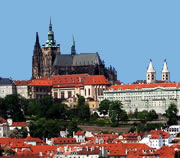
Prague Castle | |
Prague is the capital city of Czechia (Czech Republic). The country lies at the heart of Central Europe, and is bordered by Austria, Germany, Poland and Slovakia. In the Middle Ages, Prague became the capital of Charles IV's Bohemian Kingdom, with Prague Castle the seat of the empire. The city has played a pivotal role in the region ever since. Prague's epic history has produced a city full of beauty, of stunning Gothic, Renaissance and Baroque era buildings, and of majestic squares. |
| | | In modern times, the statist communist era of the mid-20th century has given way to dynamic capitalism. Tourism in Prague has helped drive its regeneration, transforming grey, run-down buildings into fine restaurants, stylish hotels and vibrant bars; a virtuous circle, which encourages an ever greater number of tourists to visit the city. Prague Tourism Fact: In 1992, the entire historical centre of Prague, all 866 hectares, was listed in the UNESCO World Cultural and Natural Heritage Register. | |
Prague Highlights | | 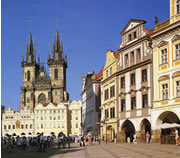
Old Town Square in Prague | |
Prague is a city to immerse yourself in, a place to explore captivating sights, discover fascinating history, and, when the moment is right, find a cosy café or pub to refresh yourself in. All the while, letting the worries of the world gently dissipate.
The city centre is compact, and many of its most beautiful areas are pedestrianised, so Prague is best explored on foot; from Wenceslas Square on one side of the city to Prague Castle on the other is just a 30-minute stroll (walking via the Old Town, across Charles Bridge, and through the Lesser Town).
One of the first things to do in Prague is simply to wander its cobbled streets and magnificent squares, admiring the stunning architecture and revelling in the city's unique ambience. |
| | 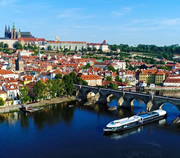
Prague river cruise | |
Your travels will inevitably lead you to the Vltava River, which runs through the heart of the city. Walk along its banks and over Charles Bridge to enjoy wide, panoramic views across the water.
A river cruise is undoubtedly the most relaxing way to view the riverside attractions, with several options to choose from, including a lunch cruise, sightseeing boat trips, and dinner cruises.
You can also admire the river scene from above by visiting Prague Castle, which is set on the hillside overlooking the city, or by riding the Petřín Funicular to the top of Petřín Hill. |
| | | Tip for Visitors: If you love learning about the history of the places you visit, Prague is one of the best cities in Europe to begin your trip with a sightseeing tour. The city boasts over a thousand years of well-documented history and is known as the “magical capital” of Old Europe - rich with mysteries and legends to uncover. Compact and highly walkable, Prague can be explored in just a few hours with the help of an enthusiastic local guide, who will give you a terrific introduction to its main sights and attractions. By explaining the history and significance of everything you see in an informative and entertaining way, the tour will set you up perfectly for the rest of your stay. | | 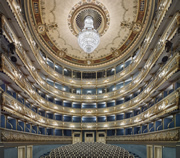
Estates Theatre in Prague | |
In terms of entertainment, classical concerts, opera and ballet are true highlights of Prague. Historically, it is a city steeped in music, with a variety of performances held daily in grand concert halls, ornate opera houses, Baroque palaces, and ancient churches.
When choosing a concert, first-time visitors to Prague - or anyone unaccustomed with attending such events - may prefer performances featuring a mix of composers. Look out for programmes such as 'Classic Spectacular', 'Best of Classics', 'Ave Maria & Arias', and 'The Four Seasons'. These concerts feature well-known pieces by Mozart, Bach, Handel, Pachelbel and Vivaldi, alongside works by celebrated Czech composers Smetana and Dvořák. |
| |
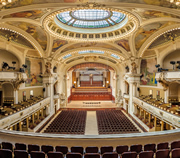
Smetana Hall at Municipal House | |
You will likely recognize many of the beautiful melodies performed at these concerts, as they often feature in films, television and advertising.
For a typically Czech experience, Black Light Theatre is unique to Prague. Shows are fast moving and highly visual, with little or no words spoken. They appeal to all ages and nationalities.
Turning to refreshments, Prague is fast establishing a global reputation for offering first-class food and drink to suit every taste and budget. Fine dining restaurants are set in the most beautiful locations, including by the river, inside historic buildings, and on high, offering stunning views over the city. |
| |
| For every day dining, Czech and pub-style restaurants serve hearty food and fast flowing drinks at very reasonable prices.
And if you enjoy a glass of the amber nectar, it's time to put on your drinking boots, because the world famous Czech beer is appropriate for consumption at any time of the day. Deeply embedded in the national physique, beer is enthusiastically consumed by the locals in cafés, pubs and beer halls throughout Prague all day, every day; the Czechs are the largest consumers of beer per capita in the world! | | 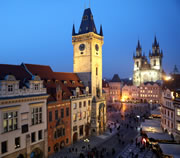
Old Town Square at night | |
While the warm, cosy pubs may draw you in during the winter, on sunny days the action moves outside. Take a seat on the terrace or in the beer garden of one of the city's many bars or cafés, order a cold beer or a chilled glass of Moravian wine, and watch the world go by. You will find that time just slips away! For a non-alcoholic treat, join the locals at one of Prague's elegant traditional cafés (kavárna). These grand, ornate establishments exude early 20th-century finesse.
Hot chocolate or coffee and cake are always the order of the day here. |
| |
| At some point in your trip you'll wish to buy something tangible, whether that be a tourist souvenir or a new dress. Well, you are in luck.
Tourism and business investment has boosted the Czech economy dramatically in recent decades, which has led to increased consumerism, making shopping a national pastime!
Prague boasts a wide variety of shops and department stores, selling local and international branded clothing and apparel. |
| |
| |
Layout of the City - Prague Map
Prague is made up of 22 administrative districts, numbered Prague 1 to Prague 22.Prague 1 is the city centre and is itself divided into several distinct areas spanning both sides of the Vltava River. On one side of the river are: • Old Town (Staré Město), centred around Old Town Square • New Town (Nové Město), centred around Wenceslas Square • Jewish Quarter (Josefov). On the other side are: • Lesser Town (Malá Strana), centred around Lesser Town Square • Castle District (Hradčany), on a hill above the Lesser Town, and home to Prague Castle. | |
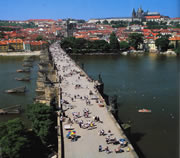
Charles Bridge & Prague Castle | |
Charles Bridge is the main pedestrian route linking the two sides of Prague. It connects the Old Town with the Lesser Town, and ultimately with Prague Castle. The sights, tourist attractions, entertainment and nightlife are spread across all five areas of Prague 1. And the city's compact layout makes it relatively easy to walk between them all. |
| |
Where to Stay in Prague
The district of Prague 1 is the best place to stay in Prague.
Book a hotel in any of its five areas and, with a good pair of walking shoes, you'll find it easy to explore the entire city centre on foot.The two most popular areas to stay in within Prague 1 are the Old Town and New Town. A third option is the Lesser Town across the river, which is quieter and offers pedestrian access to the other two via Charles Bridge. With plenty of hotels and apartments in Prague 1, prices are highly competitive. Accommodation in Prague's other districts is generally cheaper, and from most of them, getting into the city centre by public transport - metro and tram - is straightforward. Public transport is particularly good in the neighbourhoods of Vinohrady and Vyšehrad (Prague 2), Smichov (Prague 5), Holešovice (Prague 7), and Karlin (Prague 8). These outlying areas have an up-and-coming vibe and offer access to local shops, bars and restaurants. | |
How Many Days IN Prague?
4 days/3 nights is ideal for a Prague trip. This allows plenty of time to explore the city's top sights and attractions, enjoy leisurely food and drink breaks, and experience Prague's vibrant entertainment and nightlife: read more.
Of course, some visitors opt for a whirlwind 2-night trip, while others prefer a more leisurely 4- or 5-night stay. You could easily spend a week in Prague and still discover new places and experiences every day.
Flight times can influence how many nights to book. If you arrive in Prague in the morning on day one, you can be out exploring in the afternoon and enjoy a great night out that evening - making a 2-night stay feasible. In contrast, if you arrive late at night and head straight to bed, you will likely need an extra night to make the most of your visit.
With longer stays, visitors can explore lesser-known sights and neighbourhoods, attend events such as festivals or exhibitions, and take day trips outside Prague to discover more of Czechia. | | Weather in Prague
The weather in Prague varies significantly across the four seasons - more so than in cities like London or Paris. Even within a single season, conditions can be highly changeable. | |
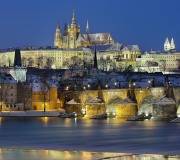
Prague by night | |
Summer (June to August) is mostly hot and dry, with blue skies and plenty of sunshine. Several heatwaves can be expected, where temperatures build to a crescendo, often culminating in a dramatic storm that rapidly cools the city. • Average daytime temperature: 25°C (77°F) • Typical daytime range: 20°C (68°F) to
31°C (88°F) • Occasional extremes: 36°C (97°F) at least once in the season. |
|
|
| Spring (mid-March to May) and Autumn (September to October) bring long spells of warm, sunny weather, interspersed with overcast days and heavy showers. Most visitors find the weather in Spring and Autumn very agreeable. • Average daytime temperature: 19°C (66°F) • Typical daytime range: 8°C (46°F) to 28°C (82°F) • Occasional extremes: 31°C (88°F). Winter (November to mid-March) ranges from mild to very cold. There are many crisp, bright, sunny days when you simply cannot wait to get outside. However, overcast skies and persistent rain are also common.
When temperatures drop, Prague can experience heavy bouts of snow lasting several days or even weeks. Prague is perhaps at its most beautiful on a sunny morning following fresh snowfall - the city simply gleams, especially along the river. • Average daytime temperature (Dec-Jan): 3°C (37°F) • Typical daytime range: -2°C (28°F) to 5°C (41°F) • Mild winter days: Up to 10°C (50°F) • Occasional extremes (snowy, icy periods): -10°C (14°F) or even -15°C (5°F). | |
When to Visit Prague
Prague is a wonderful city to visit all year round. The dramatic contrasts in weather and temperature only add to its appeal. The majestic squares, historic buildings, towers, and cobbled streets are a joy to explore in both the hot summer sunshine and the snows of winter. The river scene and the parks and gardens offer different experiences with every season.Tourist attractions, restaurants and theatres are equipped to welcome visitors at all times; buildings are air-conditioned in summer and heated in winter. Prague is somewhere to simply kick back and relax. From spring to autumn, enjoying an al fresco drink at a pavement café or in a beer garden while basking in the sunshine can be a highlight of your trip. In contrast, during winter, a warm and cosy ambience awaits you inside the city's many pubs, restaurants and traditional cafés. Spring (mid-March to May, including Easter) is typically the most popular season for tourists to visit Prague. It's followed by Autumn (September to October), and then Summer (June to August). Winter (November to mid-March) tends to be much quieter, except for December, when large numbers of visitors come for the Christmas Markets and New Year's Eve celebrations.
January, after the first week, is usually the quietest time of the year. Hotel rates naturally fluctuate with demand. The peak months, when hotel prices are the highest, are April, May, June, September, October and December. July and August present an anomaly to exploit. While Prague remains busy, there are fewer visitors than in spring, as many Europeans prefer to head to a Mediterranean beach. This leads to lower hotel rates, and yet the weather is mostly glorious. November, January and February offer the opportunity to enjoy a budget-friendly Prague city break without the crowds. You gamble on the weather, but sometimes, wandering around the cobbled streets of the Old Town and Lesser Town, you feel you have the city all to yourself.
Tip for Visitors: If you are able to, avoid staying over the weekend. Even in peak season, visitors can find bargain hotel rates on stays between Sunday and Thursday nights. Flights to and from Prague are most expensive on Fridays and Sundays, prices are average on Thursdays and Mondays, and cheapest on Tuesdays, Wednesdays and Saturdays.
Combining the cost of a hotel and flights, the best value 3-night Prague trips tend to be from Monday to Thursday, Wednesday to Saturday, and Saturday to Tuesday. Prices for other tourist services: While flight and hotel prices fluctuate, the cost of sightseeing, eating and entertainment in Prague remain mostly the same throughout the year. | |
What to Wear in Prague
Spring, Summer and Autumn Clothing: On fine weather days from spring through to autumn, visitors will appreciate packing cool shirts, shorts, skirts and dresses. Don’t forget sunscreen, sunglasses, and a hat. During the height of summer, the warmth of the day often lingers into the evening, so light clothing is suitable for nighttime activities too.Even in summer, though, be prepared for cold snaps, heavy showers, or the occasional storm. Pack a jumper, sweater, or fleece, along with a waterproof jacket. Winter Clothing: In winter, dress warmly in layers to stay comfortable. Thermals or base layers are useful for added insulation. For outer protection against the elements, bring a warm, waterproof jacket, plus a fleece-lined hat and gloves. Footwear: Prague is an ideal city to explore on foot.
The city centre is compact, making it easy to walk between the sights and attractions, and many landmarks - such as Prague Castle, Charles Bridge, Old Town Square and Wenceslas Town Square - are partially or fully pedestrianised. A comfortable pair of walking shoes or boots is essential to make the most of your visit. How to Dress for the Evening: Prague is an easy-going city, and the general rule is to dress as you feel comfortable. For restaurants and entertainment venues, visitors wear a range of styles from casual to formal. Casual clothing is acceptable at most places, even for classical concerts in churches. However, visitors should dress for the occasion when attending performances at opera houses and grand concert halls, and when dining in high-end restaurants.
Shops: If you are caught out by the weather, there are shops that can help. Department stores like Marks & Spencer and Primark, shoe shops such as Bata, and specialist outdoor retailers like Rock Point offer a good selection of clothing and footwear for any unexpected turn in the weather. For a one-stop shop, Palladium is the largest shopping mall in central Prague and may have everything you need under one roof. | |
Most Beautiful Views in Prague | Towers | |
| |
| To dine with a view, see restaurants with a view or riverside restaurants. | |
Sights & Tourist Attractions | |
| |
| For a full list of places, view our guide to the Prague sights and tourist attractions. | |
Czech Language
The official language spoken in Prague and throughout Czechia is Czech. It is a consonant-rich Slavic language that uses the Latin alphabet, supplemented with several diacritical marks such as č, š, ž, ě, and ř.
Czech is widely regarded as one of the more challenging European languages to learn, particularly for speakers of Latin-based and Germanic-based languages. Although Czech is a phonetic language - meaning words are generally pronounced as they are written - native English speakers may find certain sounds difficult, especially the unique ř sound, along with mastering Czech's rhythm and stress patterns. Fortunately for visitors, thanks to the demands of tourism and globalisation, English is widely spoken in Prague, especially among the younger generation. | |
Czech Phrases & Pronunciation
Good day / Hello = Dobrý den (Dobree den)
Good evening = Dobrý večer (Dobree ve-chair)
Goodbye = na shledanou (Naskledanou)
Hi / Bye = Ahoj (Ahoy)
Yes = Ano (Ano)
No = Ne (Neh)
Thank you = Děkuji (Dyekooyih)
Cheers = Na zdraví (Na-zdra-vee)
Where's the toilet? = Kde je záchod (kdeh-yeh zaakhot)? |
|
Prague in Czechia |
|
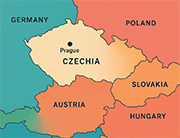
Prague, Czechia in Europe | |
Czechia (Czech Republic) covers 78,864 square kilometres (30,449 square miles), and is divided into 14 regions. Prague is in Central Bohemia, the largest region of Czechia. The highest mountain in Czechia is Snezka (1604m). The longest river in Czechia is the Vltava River (434km), which flows from the Bohemian Forest in the south of the country to meet the Elba at Mělník in the north. On its journey, the Vltava passes through heart of Prague. |
| |
Czech People
The population of Prague is 1.4 million. The population of Czechia is 10.9 million.Czechs belong to the West Slavic group of peoples, along with Poles, Slovaks and Lusatians. Romanies (or Gypsies) form the most conspicuous minority in Czechia. They are thought to descend from Indian migrants in the 15th century.
Migration
Over recent decades, a significant number of individuals from Central and Eastern European countries have migrated to Prague to work in the city’s booming tourism and construction sectors - particularly from Slovakia, Russia and Ukraine.The Vietnamese community represents the largest non-European ethnic minority in Czechia. Additionally, there is a small but steadily growing population of Arabic-speaking newcomers, especially concentrated in Prague. | |
Religion in Czechia
Christianity is the dominant religion in Czechia, with the Roman Catholic Church being the largest denomination. Several Protestant churches are also present, including the Czechoslovak Hussite Church and the Evangelical Church. | |
Tourism in Prague: Visitor Numbers | |
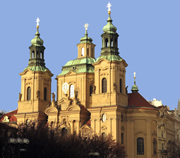
St. Nicholas Church in Prague | |
Tourism in Prague is hitting record highs, with around 7.5 million visitors arriving each year. Visitor numbers are growing by nearly 10% annually. The largest groups of tourists come from Germany, the United Kingdom and the United States.
The highest increase in tourism to Prague is from Asia, particularly from Israel, South Korea, China, Saudi Arabia and the United Arab Emirates. To meet rising demand, Prague Airport has expanded its network of direct flights to more Asian cities. |
| | | |
Additional InformationFor practical information, including tips on Prague currency exchange, prices, WiFi and mobile connectivity, medical services, and dangers and annoyances, view Prague Tourist Information. For travel information, view Getting Around Prague by Public Transport and Travel to Prague.
For a hassle-free way to plan your Prague trip, the Prague Package includes hotel accommodation, airport transfers, a sightseeing tour, and a river cruise. If you have any questions, feel free to contact us. Read what visitors to Prague enjoy doing in our Prague Experience reviews, where you will find feedback on tours, trips, attractions, and memorable experiences shared by travellers:
Latest (2026) Prague Experience Reviews - Visitor Feedback - Things To Do in Prague |
| |
| |
|
 CURRENCY GUIDE CURRENCY GUIDE |  | | £1 = 27 CZK |
| |  | | €1 = 24 CZK |
| |  | | $1 = 20 CZK |
|
|
|
| |
| |
|